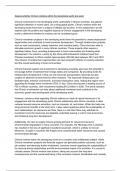Assess whether China’s motives within the developing world are good
China's involvement in the developing world, particularly in African countries, has gained
significant attention in recent years. As a rising global power, China's motives within the
developing world have been a subject of debate and scrutiny. In this assessment, we will
explore both the positive and negative aspects of China's engagement in the developing
world to determine whether its motives can be considered good.
China's investment projects in the developing world have the potential to create employment
opportunities and contribute to local economic development. Through infrastructure projects,
such as road construction, railway networks, and industrial parks, China has been able to
stimulate economic growth in many African countries. These projects often require a
significant labour force, providing employment to local communities and fostering skills
development. For instance, a study by the China Africa Research Initiative found that
Chinese investment in Africa created approximately 300,000 jobs between 2014 and 2018.
This infusion of employment opportunities can have long-term effects on poverty reduction
and the overall well-being of local communities.
China's financial support and investment in developing countries also have the potential to
encourage further investment from foreign states and companies. By providing funds for
infrastructure development, China not only improves transportation networks but also
creates an attractive environment for other investors. The improved infrastructure can
facilitate trade, enhance connectivity, and lower transaction costs, making the region more
appealing for foreign direct investment (FDI). In fact, China has become a leading source of
FDI in African countries, with investments totaling $4.23 billion in 2020. This trend indicates
that China's involvement can help attract additional investment and contribute to the
economic growth and development of the developing world.
However, concerns arise regarding China's reliance on trade of natural resources in its
engagement with the developing world. China's relationship with African countries is often
centered around resource extraction, such as minerals, oil, and timber. While this trade can
bring economic benefits in the short term, it also raises questions about the sustainability of
such relationships. As resources are finite, there is a risk that China may withdraw its
investment once the resources are depleted, potentially leaving a void in local economies
and hindering long-term development.
Additionally, the race to supply China's growing demand for resources has led to
environmental degradation in many countries. For example, the Nchanga mine in Zambia
has resulted in the loss of significant woodland savannah, which is unlikely to recover.
Moreover, oil spills in countries like Angola have contaminated water resources and caused
environmental damage.
China's motives within the developing world are a complex and multifaceted subject. While
China's investment projects and financial support can generate positive outcomes, such as
job creation and attracting further investment, concerns remain regarding the sustainability of
its resource-driven relationships and the environmental impact of its activities. It is crucial to
critically assess China's motives and actions, taking into account the long-term
consequences and the overall well-being of the countries involved. Sustainable and mutually




